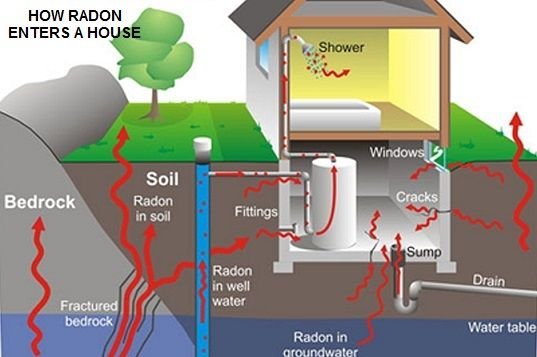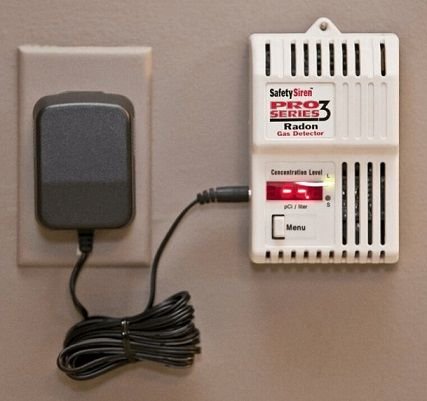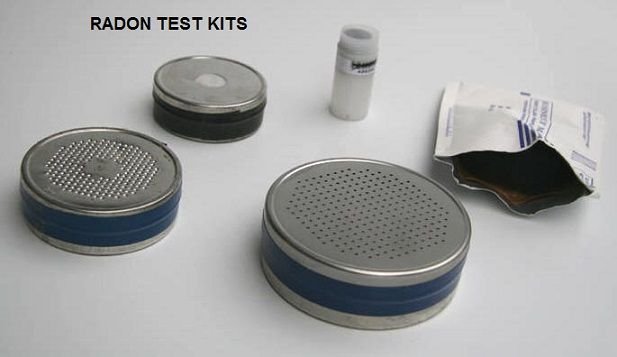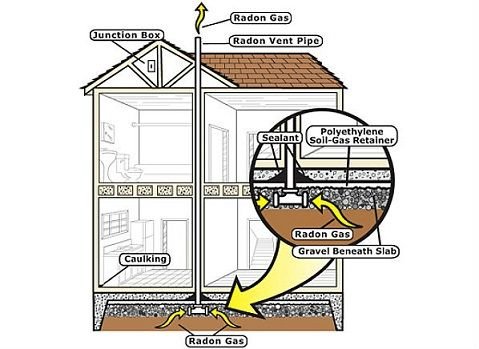HOW TO DETERMINE RADON CONTENTS IN HOMES
When it comes to issues of cancer risk and protecting you and your family from a key cause of lung cancer, one most important and very simple thing to do is to get your home tested for radon.
If you don't know the radon status of your home, you are sitting on a keg of gun powder, anytime, any moment, radon could set you ablaze if you fail to have your home tested.
About Radon
Radon is ubiquitous, it can be found everywhere but the level of its hazard differs in locations based on geological and geographical conditions as reported by UNSCEAR, 1982. Due to its nature as noble gas, it is easily mixed with the air we breath. Radon is soluble in water and can be ingested to our body system through the water we drink. I consider radon as an unseen guest because it is colourless and can not be seen with our unaided eye only, we can not perceive the odour with our nose because it is odourless. It can only be detected and measured through a detector.
Radon gas occurs naturally in a small amount outdoors. It becomes concentrated and build up in homes through various ways like cracks in floors or walls, construction joints, or gaps in foundations around pipes, wires or pumps and also through the water supply, which has much lower risk than Radon entering your home through soil. Radon levels are usually highest in areas with low ventilation such as the basement or crawl space.
Read more about radon in my previous posts here

Picture showing how radon enters a house
Why do you need a test?
Radon is a single largest contributor to an individual's background radiation dose and it is thereby considered as being hazardous to health. If you are breathing in too much radon, you might not feel sick or show any symptoms right away, you can not even quantify the amount and rate at which you inhale it.
About 21,000 deaths from lung cancer are attributed to radon exposure each year according to the US Environmental Protection Agency (EPA). About 480,000 deaths a year due to lung cancer are caused by smoking. It will be very unfortunate to combine smoking with inhalation of radon gas, this increases the risk of getting lung cancer more than either smoking or getting exposed to radon alone.

Test your home for Radon
Testing your home for radon is the best thing to do, it is easy, reliable and does not cost much. You can hire a professional tester to do it for you or you can do it yourself with a kit you buy at a hardware store, home improvement stores or online, if you think you"ll have the time. It is necessary to test for radon in important parts of your home where people spends time, areas such as living room, bedrooms, playrooms e.t.c.
A test can be carried out in two way, namely; short-term tests which take 2 and 90 days of investigation, and long-term tests which involves more than 90 days of investigation. It should be noted that the test kits for the short term test are different from that of long term test. Radon can also be tested using an electronic radon monitor. Professionals prefer to use an electronic radon detector because it has high accuracy and faster than using a rest kits. An electronic radon detector image is shown above to the right.
Step by step method of testing for radon using test kits are described below:

Step 1: The first step to radon testing is to buy radon test kits from home improvement store or you can make an order online. It is recommended that any radon test kit you will buy should meet the Environmental Protection Agency's (EPA) requirements. There are various kinds of radon test kits but they are all categorized into two; the short term and long term radon air testing kits. The short term kits can take radon measurement within 2 to 90 day of investigation, short term radon test kits is recommended for home owners. The long term test kits are majorly used bu professional, it can take measurements from 90 days to a year, therefore it gives more accurate results and can be used to estimate average annual effective radon level in homes. It is important to read and understand the instructions on the test kits before using it.
The image of radon test kits is shown above to the left.
Step 2: For high accuracy and performance of the test kits, all doors and windows must be closed 12 hours before and throughout the test. Fans and ventilator that circulate air within the room can be and be operated while devices such as fan, A.C, ventilators that bring air from outside should be avoided because they can contaminate the indoor air and also affect the result.
Step 3: place the test kits on a table of height 5 meters from the floor level, a normal height of a person in a sitting position. The kits should not be placed near windows, doors, areas with high humidity, heat and fumes or smoke such as the kitchen, bathroom, for accurate results. The test kits must be placed in a place where people spend more time such as the living rooms and bedrooms. The kits are paced undisturbed for 2 t0 90 days for short term measurement and 90 days and above for long term measurement. If your kit contains liquid scintillation vials, place the vials about 15 cm apart on the table for best results.
Step 4: After the test, return the radioactive kits back into the original package and tightly seal it to avoid contamination of the test. Sent the package through E-mail to the lab address on the package within 1 or two days after testing. Expect to receive the result of the test in few weeks after its arrival to the lab, the result might be sent through E-mail or it can be checked online but most lab deliver results through both the E-mail and online.
Note that if the result of your test is over 4pCi/L safe level as recommended by the United State Environmental Protection Agency (EPA), it is necessary to fix your home by hiring professionals to do it for you.
It's important to remember that there is no safe level for radon, so readings below 4 pCi/L still pose some risk of lung cancer and other lung diseases due to long term exposure, therefore, you can decide to fix your home if the radon results read between 2-4pCi/L.
For more information on how to test your home for Radon read A Citizen’s Guide to Radon produced by EPA,

Prevention and precautions
If it is confirmed that radon levels in your home are high, it is important to take steps to lower the amount of radon in your home. Installation of a vent pipe system and fans to pull radon from beneath the house and vents it to the outside is the most common method used to reduce radon level in homes as it was observed that radon accumulates most in a non vented area. This method known as sub slab suction could reduce the radon level in a home by more than 90%. Sub slab suction method of radon removal is described by the picture at the left.
Radon enters your home through your water supply, therefore, it is necessary to investigate the water supply source to prevent radon accumulation in homes through the water supply. If the water supply source is tested for radon and the levels are high, you can have the water supply treated so that the radon can be removed before it enters your home. If your water comes from a public water supply, you should contact your supplier for radon test result to confirm that the water is adequately tested for radon.
Cracked walls and floor openings should be amended to prevent radon from escaping through them to a home.
Before building construction, the land meant for construction should be tested for radon by professionals, so that proper recommendation could be made about the future implication based on the present radon status of the land.
What to do If you think you have been exposed

You can only know if you have been exposed to radon or not only if you consult your doctor for a routine checkup for lung cancer. If you are a smoker and you think that you have been exposed to high level of radon, you have to first stop smoking and also consult your doctor for a checkup because exposure and smoking can raise the risk of having lung cancer. People that could be exposed through the nature of their work such as Uranium miners must go for a regular checkup for lung cancer. Tenants should make sure that their homes be tested by the landlord before you pay the rent.
Radon accumulates in higher concentration indoor (home) especially in areas with low air ventilation than outdoor, therefore, we should make available enough ventilators in our homes and also we must do a periodic radon test for radon in our homes, so that we will have the knowledge of the radon concentrations in our homes. As there is no safe limit for radon exposure, it is necessary to fix our home once radon level is between 2 to 4 pCi/L.

Statistical analysis of radon by EPA
Thanks for reading, hope you've added to your knowledge
Image Credit
Image 2
Image 3
Image 4
Image 5
RADON RADON RADON... This is truly help full I think in Africa we should really look into it mustly in the undeveloped area.... Resteemed will also submit it to @steem-africa
You are right my brother, we just have to look into issues of radionuclides because people are dying every day without known causes. We Nigerians should wake up to take up responsibilities ourselves, the government will not do everything for us. Get your home tested today, fix it if necessary and stay healthy.
Congratulations! This post has been upvoted from the communal account, @minnowsupport, by holuwarbory from the Minnow Support Project. It's a witness project run by aggroed, ausbitbank, teamsteem, theprophet0, someguy123, neoxian, followbtcnews, and netuoso. The goal is to help Steemit grow by supporting Minnows. Please find us at the Peace, Abundance, and Liberty Network (PALnet) Discord Channel. It's a completely public and open space to all members of the Steemit community who voluntarily choose to be there.
If you would like to delegate to the Minnow Support Project you can do so by clicking on the following links: 50SP, 100SP, 250SP, 500SP, 1000SP, 5000SP.
Be sure to leave at least 50SP undelegated on your account.